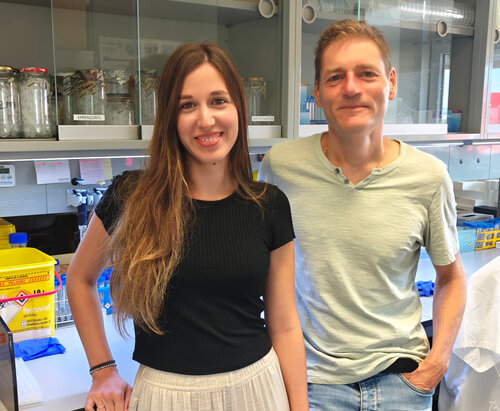Researchers at IRBLleida and IDIBELL identify key molecules in the progression of endometrial cancer
This is a key advance in designing new treatments that can address diseases prevalent among women, such as endometrial cancer and endometriosis
A research team made up of staff from the Lleida Biomedical Research Institute (IRBLleida), the Bellvitge Biomedical Research Institute (IDIBELL) and the Biomedical Research Network Centre for Cancer (CIBERONC), among others, has identified a group of regulatory molecules that can have a decisive influence on the progression of endometrial cancer. In the study, recently published in the journal Cell Death & Disease, they reveal the role of an endometrial cluster (called miR-424(322)~503) in endometrial cancer.
MicroRNAs (miRNAs) are small molecules that regulate gene expression and play a key role in many biological processes, including cancer. In this context, they play an important role in several stages, from the onset of the disease to its progression and metastasis, but their contribution varies greatly depending on the specific type of miRNA and the specific type of cancer. In endometrial cancer, although several miRNAs have been identified so far, much remains to be discovered about how they act in vivo in the body. This research is a major step forward in this direction.
Endometrial cancer is a complex cancer in which several molecular pathways involved in the normal maintenance of the endometrium are altered, contributing significantly to the onset and progression of cancer. Mutations in the PTEN gene, which is often mutated in patients, are among the most common.
A group of miRNAs with different roles depending on the type of cancer
When the PTEN gene loses its function, a molecular pathway called PI3K/AKT is excessively activated, promoting cell proliferation while preventing programmed cell death (apoptosis), an essential mechanism for maintaining tissue balance. Excessive proliferation and lack of cell death are two key ingredients in conferring a malignant profile on endometrial cells, which become cancerous.
The researchers' work sought to delve deeper into the relationship between PTEN loss and PI3K/AKT activation to see what other biological actors are involved. Focusing on the study of miRNAs, they have managed to identify a specific group, the miR-424(322) ~503 cluster, which appears to be overexpressed when PTEN is lost.
This cluster, consisting of two miRNAs (miRNA-424 and miRNA-503), is critical in the regulation of various cellular processes related to cancer. 'Functionally, the role of this group of miRNAs in cancer is paradoxical, as they can be overexpressed or inhibited depending on the type of cancer, and act as oncogenes or tumour suppressors depending on the cell type and its microenvironment,' explains the study's first author and IRBLleida researcher, Maria Vidal. 'Until now, their specific role in endometrial cancer had been explored minimally, so it was not well understood how they acted in this context,' she adds.
A decisive role in endometrial cancer, which has been on the rise in recent years
Now, thanks to the new study, we have a more concrete idea of the role of these molecules in endometrial cancer. To this end, genetically modified mice have been created that lack both the PTEN gene and the miRNA cluster. The results show how the double absence reduces the proliferation of cancer cells and restores the cells' ability to die naturally, slowing tumour development. In other words, "in the context of PTEN gene loss, which often occurs in endometrial cancer patients, this cluster becomes a critical regulator of carcinogenesis: it triggers molecular changes that contribute to the development of cancer," explains the co-director of the study, principal investigator of the Gynaecological Cancer group at IDIBELL and also a CIBERONC researcher, David Llobet.
The research team has verified this by going one step further: without the cluster, the aggressiveness of the tumour is significantly reduced and, in some cases, its formation is even prevented. This is a very important discovery, considering that endometrial cancer affects nearly 420,000 women worldwide and accounts for more than 5,000 new cases in Spain each year. It is the most common cancer of the female reproductive system and the sixth most common cancer in women. Its incidence has increased steadily worldwide in recent years, partly due to the ageing population, as it mainly affects post-menopausal women over the age of 60.
This research has been made possible thanks to funding from the Lleida Biomedical Research Institute, the Ministry of Science, Innovation and Universities, the Carlos III Health Institute (co-funded by the European Regional Development Fund. ERDF, a way to build Europe) and the CIBERONC network (CB16/1200231).
Article: Vidal-Sabanés, M., Bonifaci, N., Navaridas, R. et al. Endometrial cancer progression driven by PTEN-deficiency requires miR-424(322)~503. Cell Death Dis 16, 705 (2025). https://doi.org/10.1038/s41419-025-08022-z

The researchers Maria Vidal and Xavier Dolcet






